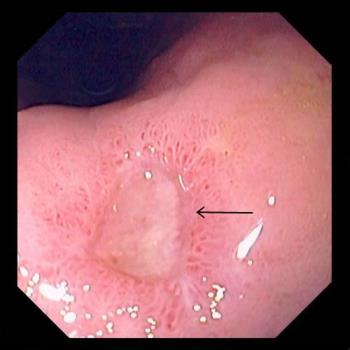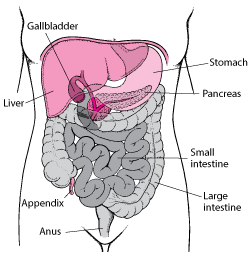What are the symptoms of a peptic ulcer?
Many people with a peptic ulcer have no symptoms. When they happen, the most common symptom is:
-
Mild to moderate belly pain (can be a burning, gnawing, aching feeling in the upper middle part of the belly just below the breastbone)
-
Use of NSAIDs (pain medicine, such as ibuprofen or aspirin) and certain other medicines
The pain usually comes and goes. Eating food usually makes duodenal ulcers feel better, but then the pain comes back in a few hours. Taking antacids also usually makes the pain better.
Other symptoms include:
-
Nausea and vomiting
-
Feeling full
What are the complications of peptic ulcers?
Peptic ulcers can cause problems such as:
-
Bleeding, which causes black stools, or vomiting blood or what looks like coffee grounds
-
A hole (perforation) through the wall of the stomach or small intestine causing severe infection and pain in your belly
Helicobacter pylori infection that isn't treated puts you at greater risk for stomach cancer.
How can doctors tell if I have a peptic ulcer?
Your doctor may suspect an ulcer based on your symptoms and just start you on ulcer treatment. If you get better, they often don't do any tests.
However, doctors may do tests if:
-
You've had symptoms for a long time
-
Your symptoms are severe or aren't typical for ulcers
-
Your symptoms didn't start until you were past age 45
-
You don't get better after taking medicine
The main test doctors do is:
-
Endoscopy (using a flexible viewing tube to look in your stomach)
During endoscopy, doctors usually take a biopsy (a sample of your tissue to look at under a microscope) to look for Helicobacter pylori bacteria or cancer.
How do doctors treat peptic ulcers?
Doctors treat ulcers with medicines, such as:
-
Antibiotics, if you have Helicobacter pylori infection
-
Acid-reducing drugs (such as proton pump inhibitors and histamine-2 blockers)
-
Antacids, such as sodium bicarbonate, calcium carbonate, aluminum hydroxide, or magnesium hydroxide
Doctors will also ask you to avoid:
-
Aspirin and other NSAIDs
-
Alcohol
-
Smoking
-
Foods that make pain or bloating worse
If you have a bleeding ulcer, doctors do endoscopy to give treatments that make the bleeding stop. If you have a hole through the wall of your stomach or intestine, you'll need surgery.



